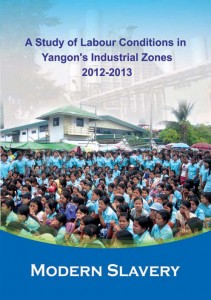Modern Slavery: A Study of Labour Conditions in Yangon’s Industrial Zones
By Labour Rights Clinic, Cooperation Program of Independent Laborers, Construction-based Labor Union and Workers Support Group • November 15, 2013 With Myanmar going through a period of transition and the space for civil society is expanding, the role of labour unions in promoting and protecting fundamental rights of workers is vital yet the challenges they face in the current environment are huge.
With Myanmar going through a period of transition and the space for civil society is expanding, the role of labour unions in promoting and protecting fundamental rights of workers is vital yet the challenges they face in the current environment are huge.
Workers in Yangon’s 13 industrial zones work in unsafe, hot, overcrowded factories, typically for around 11 hours per day, 6 days per week. A complex system of bonus pay for punctuality and non-absence pay as well as a meagre daily wage leaves most workers needing to work overtime to make money. This cycle is completed by the need to go to pay-day-lenders at the end of the month to make up for the shortfall in meeting their basic needs. Thus they have no choice but to continue working as many hours as possible to pay off this debt. The living conditions are also squalid, and transportation between factory-provided hostels or rented spaces shared with many others can add hours onto a day and for many women leave them vulnerable to sexual harassment late at night.
Yet the last two years, more and more labour unions have emerged from the shadows of direct military rule, and two waves of strikes have seen workers fight for their rights as people are beginning to test the waters in a new political environment. Unfortunately their rights are not adequately protected by law. Despite two new laws promulgated in 2012, the Labour Organization Law and the Labour Dispute Settlement Law, weaknesses, holes, and lack of concrete protection in this legislation means that they contravene aspects of the two core ILO Conventions that are relevant to this report, the Freedom of Association and Protection of the Right to Organise, Convention N°87 and the Right to Organise and Collective Bargaining, Convention N°98. Striking workers and labour activists are routinely threatened, intimidated, or dismissed by employers. The mechanisms established by the legislation do not sufficiently protect workers against such consequences while dispute settlement processes are further complicated by third parties who intervene with good intentions yet lack the competency and knowledge of labour standards or an awareness of the situation on the ground for workers themselves.
The struggle for workers in Yangon’s industrial zones, and indeed everywhere in Myanmar, will be long and complex. Despite some positive noises from the government there is still a lack of political will to genuinely protect and promote labour rights. With the imminent onset of a huge increase in foreign direct investment, the industries in Yangon’s industrial zones, especially the garment industry, are set to grow substantially over the next few years, thus exacerbating existing problems unless labour standards are vastly improved. Prevailing corruption and the lack of rule of law is another debilitating factor in this struggle as those with power and money, who are certainly not the workers, seek to maintain the status quo.
Download the full report here.
Tags: Construction-based Labor Union, Cooperation Program of Independent Laborers, Labor Rights, Labour Rights Clinic, Workers Support GroupThis post is in: Business and Human Rights, Human Rights, Spotlight
Related Posts








 All posts
All posts